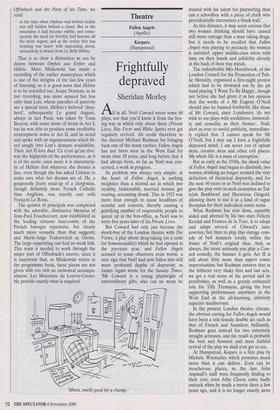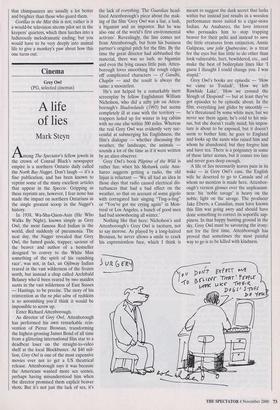Theatre
Fallen Angels (Apollo)
Keepers (Hampstead)
Frightfully depraved
Sheridan Morley
Al in all, Noel Coward wrote some 60 plays, not that you'd know it from the bor- ing way in which only about three (Private Lives, Hay Fever and Blithe Spirit) ever get regularly revived. All credit therefore to the director Michael Rudman for bringing back one of the many rarities: Fallen Angels has not been seen in the West End for more than 30 years, and long before that it had always been, so far as Noel was con- cerned, a work in progress.
Its problem was always very simple: at the heart of Fallen Angels is nothing weightier than a second act in which two wealthy, fashionable, married women get roaring, screaming drunk This in 1925 was more than enough to cause headlines of scandal and concern, thereby causing a gratifying number of respectable people to queue up at the box-office, as Noel was to write five years later of his Private Lives.
But Coward had only just become the shock-boy of the London theatre with The Vortex, a play about drug-taking (as a code for homosexuality) which he had opened in the previous year, and Fallen Angels seemed to some observers even worse, a sure sign that Noel had now fallen into still more profound depths of depravity; as James Agate wrote for the Sunday Times, `Mr Coward is a young playwright of extraordinary gifts, who can no more be trusted with his talent for playwriting than can a schoolboy with a piece of chalk who providentially encounters a blank wall.'
At this distance, it may seem curious that two women drinking should have caused still more outrage than a man taking drugs, but it needs to be recalled that Fallen Angels was playing to precisely the women it satirised: upper middle-class wives with time on their hands and infidelity already at the back of their tiny minds.
The redoubtable Mrs Hornibrook, of the London Council for the Promotion of Pub- lic Morality, organised a first-night protest which had to be drowned out by the pit band playing 'I Want To Be Happy', though not before she had given it as her opinion that the works of a Mr Eugene O'Neill should also be banned forthwith, like those of Mr Coward, since Londoners 'do not wish to see plays with sordidness, immorali- ty and sexuality as their themes'. Noel, alert as ever to useful publicity, immediate- ly replied that 'I cannot speak for Mr O'Neill, but I may say I have a frightfully depraved mind: I am never out of opium dens, cocaine dens and other evil places. My whole life is a mass of corruption.'
But as early as the 1930s, the shock value of Fallen Angels had begun to diminish; two women drinking no longer seemed the very definition of theatrical depravity, and for the next 40 years or so Noel was inclined to give the play over to such eccentrics as Tal- lulah Bankhead and Hermione Gingold, allowing them to use it as a kind of vague floorplan for their individual comic turns.
What Rudman has now done, superbly aided and abetted by his two stars Felicity Kendal and Frances de la Tour, is to adopt and adapt several of Coward's later rewrites, but then to play this vintage com- edy of bad manners totally within the frame of Noel's original idea. And, as always, the more seriously you play a Cow- ard comedy, the funnier it gets; Act II is still about little more than expert comic improvisation, but Rudman ensures that in the hitherto very shaky first and last acts, we get a real sense of the period and its proclivities, as well as a greatly enhanced role for Tilly Tremayne, giving the best supporting performance anywhere in the West End as the all-knowing, infinitely superior maidservant.
In the present London theatre climate, the obvious casting for Fallen Angels would have been a tele-female double act such as that of French and Saunders; brilliantly, Rudman goes instead for two extremely straight actresses, and the result is probably the best and funniest and most faithful revival of the play we shall ever get to see.
At Hampstead, Keepers is a first play by Michele Winstanley which promises much more than it can deliver. Zoos can be treacherous places, as the late John Aspinall's staff were frequently finding to their cost; even John Cleese came badly unstuck when he made a movie there a few years ago, and it is no longer exactly news that chimpanzees are usually a lot better and brighter than those who guard them.
Gorillas in the Mist this is not; rather is it a would-be television sitcom pilot set in the keepers' quarters, which then lurches into a ludicrously melodramatic ending; but you would have to be very deeply into animal life to give a monkey's paw about how this one turns out.



























































































 Previous page
Previous page